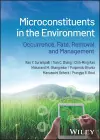
Microconstituents in the Environment
7 contributors - Hardback
£175.00
Dr. Dipak Ashok Jadhav received his PhD from Indian Institute of Technology Kharagpur. Currently, he is an Assistant Professor, Department of Agricultural Engineering, Maharashtra Institute of Technology, Aurangabad, India. He has received several prestigious awards and fellowships including Young Technological Innovation Award (GYTI), Young Engineers Award, Promising Engineers Award, Swachthon Award from Ministry, DAAD fellowship, Silver medal for post graduate studies at IIT Kharagpur, and more. His research area is microbial fuel cells, bioelectrochemical systems, sanitation, bioenergy research, water management, and waste to energy recovery. He has over 17 papers in various peer-reviewed SCI journals including Renewable and Sustainable Energy Reviews, Bioresource Technology, Energy, Applied Biochemistry and Biotechnology, and more, and he’s authored 11 book chapters. He also serves as editorial board member/reviewer for many International Journals and is a member of several scientific societies in the field of microbial fuel cells, microbial electrochemical systems and bioenergy research. Dr. Manaswini Behera is an Assistant Professor of Environmental Engineering in the School of Infrastructure, Indian Institute of Technology, Bhubaneswar, which is among the top 20 Indian institutions. She has received her Ph.D. in Environmental Engineering from Indian Institute of Technology Kharagpur and master’s degree in environmental engineering and management from Indian Institute of Technology Delhi. She has received prestigious award like young scientist award. She is the associated editor of the ASCE Journal of Hazardous, Toxic and radioactive Waste. She has published peer reviewed 30 journal papers and 28 international conference presentations and proceedings and 14 refereed book chapters. Her area of research is bioenergy recovery during treatment of industrial wastewater and solid waste in microbial fuel cell, grey water treatment and reuse, developments of separators for bio-electrochemical systems. She has successfully completed three sponsored research projects. She is the principal investigator for the ongoing project, SARASWATI-2.0 (INR 12 million) jointly funded by European Union and Department of Science and Technology, Govt. of India. She is at present supervising five research scholars. She is also editor for the book Microconstituents in the environment: occurrence, fate, removal and management to be published by John Wiley & Sons. Dr. Surajbhan Sevda, completed Doctoral Degree in 2013 from Indian Institute of Technology Delhi, New Delhi, India. He is currently an Assistant Professor at the Department of Biotechnology, National Institute of Technology, Warangal, India. Prior to this, he was a technical officer (research scientist) at IIT Guwahati, India. He has published more than 28 articles in scientific journals and book chapters. He received his Bachelor of Engineering in Biotechnology and Master of Technology in fermentation technology from University of Rajasthan and Institute of Chemical Technology (formerly known as UDCT), University of Mumbai, India, in 2006 and 2008, respectively. He was a visiting scientist at University of Calgary, Canada in 2018. His research experience lies in the bioreactor design, modelling of microbial growth, biofuels, and bioenergy, life cycle analysis (LCA), metal recovery, biosensor development, green chemistry, microbial electrosynthesis, enzyme and antibiotic production. Maulin Shah is an active researcher and scientific writer for over 20 years. He received a B.Sc. degree in 1999 in Microbiology from Gujarat University in Godhra, Gujarat, India. He also earned his Ph.D. degree in 2005 in Environmental Microbiology from Sardar Patel University in Vallabh Vidyanagar, Gujarat, India. His research interests include biological wastewater treatment, environmental microbiology, biodegradation, bioremediation, & phytoremediation of environmental pollutants from industrial wastewaters. He has published more than 250 research papers in national and international journals of repute on various aspects of microbial biodegradation and bioremediation of environmental pollutants. He is the editor of 55 books of international repute.